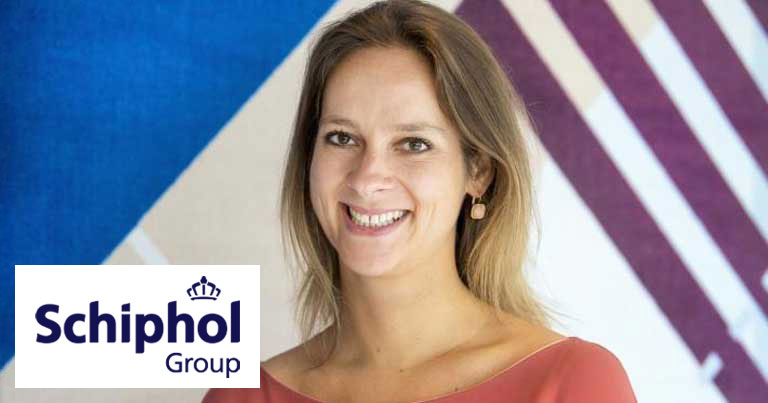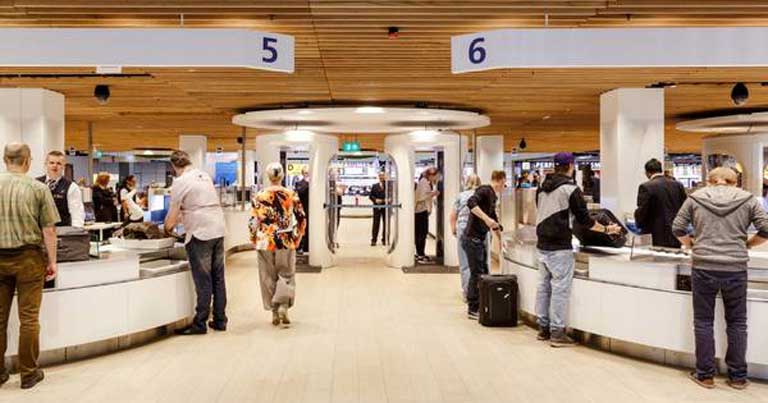In 2015, Amsterdam Airport Schiphol set out on a mission to be the world’s leading digital airport by 2018. Four years later, FTE caught up with Rosanne van der Stam, Value Stream Owner Customer Experience, Royal Schiphol Group, who will be speaking in the FTE EMEA Digital & Innovation Conference (19-20 June, Istanbul). Here, she outlines how the airport is embracing digitalisation to elevate the passenger experience in today’s digital era, while building its organisational capabilities.

Future Travel Experience (FTE): What was Schiphol’s strategy for achieving its ambition to be “the world’s leading digital airport” by 2018?
Rosanne van der Stam, Value Stream Owner Customer Experience, Royal Schiphol Group: Aiming to become the world’s leading digital airport is very motivational: it gets you out of bed in the morning. At least, it gets me excited, it is something I want to be part of. But it has never been a goal in itself. First of all, we want to be Europe’s preferred airport, meaning we want excellent visit value for both passengers and airlines; something that can no longer be done without digital products and services.
Also, what has been really important for Schiphol, is that we have always understood that becoming the world’s leading digital airport is not only about investing in new technologies and delivering digital products and services. It is maybe even more about altering the organisation and changing the way of working. Yes, we invest in predictive modelling, biometrics, blockchain, analytics, and API management. But it is also about adopting a radical client focus, faster execution, continuous learning, better collaboration, and attracting the right talent. Investing in building organisational capabilities has been at the core of our strategy, and I believe this has made a big difference. Digital is already embedded in the Royal Schiphol Group organisation. But I also think that digitalisation is a mission that should never be considered as fully achieved. Becoming a world champion isn’t the goal, it is about staying on top of your game, year after year after year.
FTE: Can you share some of the airport’s main achievements and projects since launching its digital transformation strategy? And in what ways have those benefitted the passenger experience and operations?
Van der Stam: We are able to reach an enormous amount of passengers through our digital channels, meaning we are in contact with passengers 24/7 from home to gate. We have 70,000 sensors measuring how busy the airport is. We then communicate for instance the actual waiting times at security, related to your flight, so you know what to expect, and whether you should hurry or not. We also have 2,000 beacons based on which we can provide location-based services.

On the other hand, this contact with passengers also enables us to actively guide them through the airport. Schiphol is accommodating 70 million passengers this year. With physical expansion possibilities being limited, we need to find ways to make better use of the existing capacity. Based on historical data we can make predictions on arrival patterns (when passengers arrive at the airport) and consequently crowdedness. In this regard, we developed a pilot “security time slots” where we asked people to make a reservation for a specific time slot to go through security. It was a successful pilot and we are currently investigating whether we can bring this to a next level or not.
Every airport has peaks during the day with regards to the number of passengers going through the terminal. Capacity at different touchpoints, for instance security, is planned based on the forecast of passenger flows. This means employees in our daily operations decide on the number of lanes that we should open up at specific moments of the day. You understand that if the forecast is too high, we have idle lanes, and if it is too low, we create queues. This year, based on a new digital product, we managed to improve this forecast. This means we enable our employees to make better decisions for our operations.
We are only one of the players in a passenger’s journey. And we realise that Schiphol is an important source of data. As part of our digital strategy we aspired to share this data with third parties, like airlines. We developed a data platform on which a range of data is collected and from which they can subsequently be shared via APIs (Application Programming Interfaces). These APIs enable multiple parties to use the same data without errors in interpretation. This will not only safeguard the integrality and quality of the data, it will naturally also be done in a controlled way, meaning in full compliance with privacy laws and agreements with partners, which is important since we are an authority that is trusted by passengers – something that we need to guard at all times.
FTE: What were some of the main challenges Schiphol faced on its digital transformation journey and how did the airport overcome these?
van der Stam: In the beginning, we had too much of an inside-out perspective, meaning that we tried to push technology. We developed digital products with external contractors, a little bit too much in isolation. For many, digital was far-flung and then nobody understands it nor wants to use it. So, it is very important to engage people from the business from the beginning. We invested in getting people acquainted with technology and all the possibilities it offers. To create a more digital mindset, making sure that employee capabilities develop and grow along with our ambitions. One way that we do so is by organising an annual digital week, in which employees are introduced to new technology. Our aim here is for employees to embrace new technology quickly, so they know that technology can provide fresh insights and become enthusiastic rather than scared. Some 900 colleagues participated last year in 30 workshops on subjects ranging from virtual reality (VR) to drones and from data science to the consequences of digitisation for leadership.
FTE: What are some of the main technological advancements that are currently on top of your agenda for 2019 and ahead?
van der Stam: These are always difficult questions to answer. I can easily say augmented reality, or voice technology, or deep learning. All these technologies are awesome, but as long as there is no real problem that we can solve or an opportunity we can seize using them, we won’t. Radical client focus. We need to look at what they need. Of course, this does not mean we do not experiment with new technologies. We want to understand the possibilities a technology offers, so that if it becomes relevant, we are ready to start using it. And if the answer is voice, then voice we will use.
Hear more from Royal Schiphol Group’s Rosanne van der Stam on lessons learned from the airport’s digitalisation journey in the FTE EMEA Digital & Innovation conference, which will take place in Istanbul, 19-20 June. Other confirmed speakers include Turkish Airlines, Swedavia, Amazon Web Services, Evelop, Vantage Airport Group, Viva Air Labs, MAG, Vueling, Lufthansa Group, Pegasus Airlines, and more. View the conference agenda here >>






